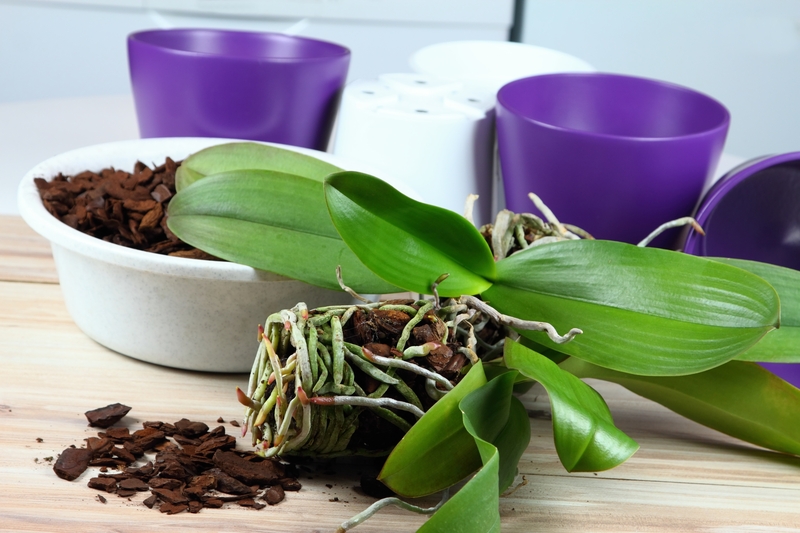Breathing Life into Fields with Decomposed Organics
Posted on 22/08/2025
Breathing Life into Fields with Decomposed Organics: Unlocking Nature's True Potential
Fertile soil is the heartbeat of agriculture. As farmers and gardeners seek more sustainable ways to enrich their lands, the magic of decomposed organics--also known as organic compost, decomposing matter, or organic soil amendments--presents a natural, eco-friendly solution. But what exactly does "breathing life into fields with decomposed organics" mean? Let's unearth the science, benefits, and best practices behind revitalizing farmlands using this age-old yet innovative technique.

What Are Decomposed Organics?
Decomposed organics refer to once-living materials--like leaves, food scraps, manure, and crop residues--that have broken down through natural processes. This breakdown, called decomposition, transforms waste into a rich, dark substance known as humus. Farmers and gardeners add these organic riches to the soil to unlock a cascade of agricultural and environmental benefits.
Why Decomposed Organics Matter
- Enhance Soil Fertility: Decomposed organics are naturally packed with nutrients like nitrogen, phosphorous, and potassium--vital elements for plant growth.
- Boost Microbial Life: Living soil teems with beneficial bacteria, fungi, and other organisms. Organics provide food for these "soil engineers."
- Support Soil Structure: Organic matter improves soil's ability to hold water and nutrients, helping roots thrive.
- Reduce Synthetic Input: Less reliance on chemical fertilizers and pesticides means a healthier environment and lower costs.
- Increase Resilience: Soils rich in decomposed organics resist erosion, drought, and extremes of weather.
The Science Behind Breathing Life into Fields
The phrase breathing life into fields with decomposed organics isn't just poetic. As organics decompose, they nourish the very ecosystem within the soil. Here's how:
Decomposition: Nature's Recycling Service
Decomposition is driven by microorganisms--bacteria and fungi--that feed on dead plant and animal materials. As they break down these materials, nutrients are released, which plants can then absorb through their roots. The process enriches the soil with life-giving elements and improves its structure.
- Organic Matter: Dead plants, leaves, and animal wastes provide the raw material.
- Microbes: Decomposers convert complex organics into accessible nutrients.
- Humus: The final product--a stable, nutrient-rich material critical for soil health.
Soil Biology: The Secret Workforce
Healthy soil is alive! A teaspoon of rich farm soil can contain billions of microorganisms, many of which depend on decomposed organics as their food source. These unseen allies help plants by:
- Fixing Nitrogen: Beneficial bacteria convert atmospheric nitrogen into forms plants can use.
- Suppressing Disease: Active soil life outcompetes harmful pathogens.
- Promoting Root Growth: Mycorrhizal fungi help plants absorb water and nutrients efficiently.
Benefits of Incorporating Decomposed Organics in Agriculture
1. Enhanced Soil Fertility
One of the most profound effects of using decomposed organics for soil is a marked improvement in soil fertility. Unlike synthetic fertilizers that supply only one or two nutrients, organic compost delivers a comprehensive buffet of macro and micronutrients, released slowly and steadily for optimum plant uptake.
2. Improved Water Management
Adding organic matter increases the water-holding capacity of soils, especially those prone to drying out. Conversely, it improves drainage in heavy clay soils. This means more consistent crop yields, even during periods of drought or heavy rainfall.
3. Enhanced Crop Health and Yield
Plants grown in soils rich with decomposed organics are often more vigorous and resilient. They're less susceptible to diseases and pests, leading to better yields and higher-quality crops.
4. Sustainability and Environmental Health
- Less Runoff and Pollution: Healthy, organic-rich soils retain nutrients, reducing the risk of polluting waterways.
- Reduced Chemical Dependency: Lower need for chemical fertilizers and pesticides translates to less environmental harm.
5. Erosion Control
Organic matter acts like glue, binding soil particles together and preventing erosion by wind and water. This is vital for long-term landscape stability--especially on sloped fields.
6. Climate Change Mitigation
Soil is a major reservoir for carbon. By increasing organic matter, farmers can help sequester (store) carbon that would otherwise contribute to climate change.
Types of Decomposed Organics to Use
There are many ways to enrich your fields with decomposed organics. Here are some of the most effective and widely used:
- Compost: A mix of decomposed plant and animal materials, rich in balanced nutrients.
- Manure: Animal manure (from cows, chickens, horses) is a classic organic fertilizer, high in nutrients and organic matter.
- Green Manures: Cover crops like clover or vetch are grown and then incorporated into the soil to decompose in place.
- Crop Residues: Leaving crop stubble and plant debris on the field to break down naturally.
- Vermicompost: Compost produced by worms, especially rich in nutrients and beneficial microbes.
How to Apply Decomposed Organics to Fields
Step 1: Source Quality Materials
Not all organics are created equal. Always source material that is fully decomposed (well-rotted) to avoid issues with pathogens or weed seeds. Avoid applying fresh manure directly to edible crops.
Step 2: Application Rates
Apply compost at rates suited to your soil type and crop needs. Typically, 5-20 tons per acre is standard. Over-application can create nutrient imbalances--test your soil regularly!
Step 3: Incorporation Methods
Tilling: On larger operations, tilling organic matter into the top few inches ensures good mixing.
No-till or Mulching: For soil health and erosion control, many choose to lay compost or mulch on top of the soil, where earthworms and microbes do the work.
Step 4: Timing
- Apply organic amendments in the fall, post-harvest, for maximum breakdown before spring planting.
- Incorporate at least several weeks (ideally months) before seeding or planting.
Common Myths About Decomposed Organics in Farming
Myth 1: Synthetic Fertilizers are Superior
Many assume that chemical fertilizers are the fastest route to healthy crops. While they provide nutrients, they cannot replicate the long-term soil-building power or ecological benefits of decomposed organics.
Myth 2: Compost is Too Slow-Acting
Quality compost releases nutrients steadily, perfectly in sync with crop needs. In fact, this slow release is what prevents leaching and runoff.
Myth 3: Organic Amendments Encourage Weeds
Only incompletely decomposed materials present this risk. Fully matured compost, especially when hot composted, is weed-free and safe.
Challenges When Breathing Life into Fields with Decomposed Organics
- Material Availability: Sourcing enough compost or manure can be challenging, especially at large scales.
- Labor and Transportation: Spreading and incorporating organic material is labor-intensive.
- Potential for Odors or Pathogens: Using improperly composted materials can introduce odors or even pathogens--always check maturity.
- Short-term Nitrogen Immobilization: High-carbon material (like straw) can temporarily tie up nitrogen as it decomposes. Mix with nitrogen-rich additives to balance.
Real-world Success: Case Studies in Organic Field Revitalization
Case Study 1: Amish Farms in Pennsylvania, USA
Many Amish farms have flourished for generations by returning animal manures, crop residues, and humanure to the land. These fields consistently outperform neighboring conventional farms in drought resistance and soil fertility.
Case Study 2: Vineyard in Southern France
A vineyard switched from chemical fertilizers to vermicompost and cover cropping. Over five years, they reported deeper, more resilient vine roots, improved wine quality, and a surge in pollinators and beneficial insects.
Case Study 3: Rice Fields in South Asia
Farmers in India and Bangladesh who adopted the practice of incorporating decomposed crop residues noticed substantial improvement in yields, reduced fertilizer expenses, and greater climate resilience during erratic monsoons.
Tips for Maximizing the Benefits of Decomposed Organics
- Diversify Inputs: Blend compost, manure, and green manures for a broader range of nutrients and microbes.
- Test Your Soil: Understand what your fields lack and amend accordingly.
- Rotate Crops: Diverse rotations help sustain soil life and further reduce disease.
- Protect Soil: Use mulches and cover crops year-round to prevent erosion and nourish the ecosystem.

Future Trends: Breathing New Life into Modern Fields
More and more, regenerative agriculture is capturing the imagination of farmers and researchers alike. Breathing life into fields with decomposed organic matter is a cornerstone of this movement, offering promise for:
- Long-Term Soil Stewardship: Building enduring fertility rather than "mining" nutrients year to year.
- Reduced Environmental Impact: Cleaner waterways, healthier air, and thriving pollinator populations.
- Greater Farm Profitability: Lower input costs, better yields, and access to premium organic markets.
Innovations like biochar, microbial inoculants, and advanced vermicomposting are amplifying the long-proven impact of decomposed organics for agriculture at every scale.
Conclusion: Nourishing the Land for Generations
Breathing life into fields with decomposed organics isn't just an agricultural trend--it's a return to nature's own wisdom. By harnessing the power of decomposition and infusing soils with organic richness, growers can achieve bountiful crops, robust soil health, and enduring environmental sustainability. Whether you're managing a vast farm or a backyard garden, the practice of revitalizing your land with decomposed organic matter lays a fertile foundation for thriving harvests today and a resilient countryside tomorrow.
Begin your journey of agricultural renewal--embrace decomposed organics and let your fields breathe with life!
Latest Posts
Neglected No More: First Steps to a Vibrant Garden Makeover
Sow Sustainability: Gardens as Climate Protectors
Inexpensive Paths to a Lush, Low-Maintenance Garden



